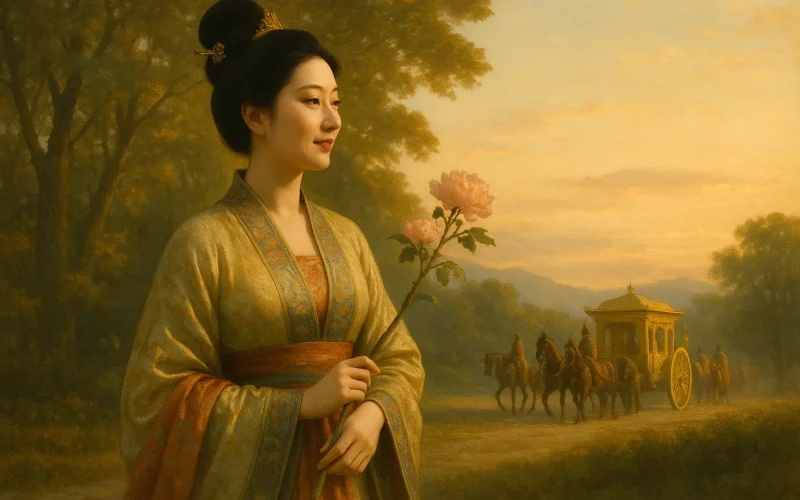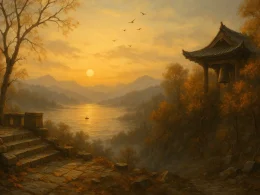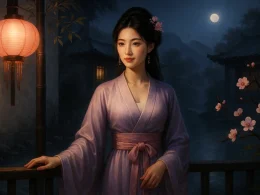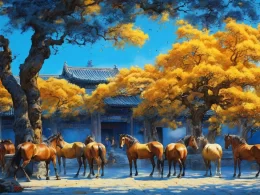The fragrant forbidden woods gleam in twilight's hue,
Leisurely before cassia boats, our view.
A bird cuts across the sky, solitary and lone,
Blossoms flare by water, as if by fire strown.
Green fields brighten in the slanting sun's last rays,
Blue mountains fade in evening mist's soft haze.
Presuming to share this feast till its final part,
I hold my brush, as if glimpsing heaven's art.
Original Poem
「侍宴应诏赋韵得前字」
虞世南
芬芳禁林晚,容与桂舟前。
横空一鸟度,照水百花然。
绿野明斜日,青山澹晚烟。
滥陪终宴赏,握管类窥天。
Interpretation
This poem was composed for an imperial occasion. Emperor Taizong of Tang often held banquets in the palace gardens, commanding his ministers to compose poems in response to set rhymes, celebrating the peaceful prosperity and natural scenery. As one of the "Twenty-Four Meritorious Officials of Lingyan Pavilion" and known for his literary talent, Yu Shinan frequently responded to such calls with poetry. This piece was written during a banquet, where the poet delicately depicts the scenery of the forbidden garden and the atmosphere of the feast—serving both as a record of the grand occasion and an expression of his inner feelings. The poem intertwines natural landscapes with personal sentiment, using clear and elegant language that reflects Yu Shinan’s dignified and subtle style.
First Couplet: "芬芳禁林晚,容与桂舟前。"
Fēn fāng jìn lín wǎn, róng yǔ guì zhōu qián.
In the evening, the forbidden grove is fragrant;
Leisurely I stand before the cassia-wood boat.
This couplet establishes the time and place: the forbidden garden at dusk, with a cassia-adorned boat. The atmosphere is serene and luxurious. "Fragrant" (芬芳 fēn fāng) refers not only to the scent of flowers but also implies the garden’s opulence; "leisurely" (容与 róng yǔ) conveys a relaxed and contented demeanor. The cassia boat may be both a real feature and a symbol, representing the poet’ comfort and ease amid the elegant banquet. Through the blend of fragrance, time, and imagery, the poet creates a tranquil and refined ambiance.
Second Couplet: "横空一鸟度,照水百花然。"
Héng kōng yī niǎo dù, zhào shuǐ bǎi huā rán.
A bird sweeps across the sky;
Flowers mirrored on the water glow as if ablaze.
This couplet captures dynamic movement and light. The bird’s flight breaks the stillness, adding vitality. "Flowers glow as if ablaze" (百花然 bǎi huā rán) depicts the dazzling reflection of blossoms on the water under the setting sun, offering visual impact and echoing the festive atmosphere of the banquet. The poet excels at seizing transient moments, connecting nature’s beauty with the celebration’s joy.
Third Couplet: "绿野明斜日,青山澹晚烟。"
Lǜ yě míng xié rì, qīng shān dàn wǎn yān.
Green fields brighten in the slanting sunlight;
Blue mountains are veiled in faint evening mist.
This is the most picturesque couplet: the former line presents vivid color—“green fields” and “slanting sun” in harmonious contrast; the latter shifts to hazy beauty—“blue mountains” and “evening mist” evoking a tranquil, distant atmosphere. The progression from bright to muted tones creates layers like an unfolding landscape painting. By blending far and near views, the poet conveys not only scenery but also his own clear and relaxed state of mind.
Fourth Couplet: "滥陪终宴赏,握管类窥天。"
Làn péi zhōng yàn shǎng, wò guǎn lèi kuī tiān.
I unworthily accompany the feast till its end;
Holding my brush, I feel as if peering at the heavens.
This couplet turns from scene to emotion. "Unworthily accompany" (滥陪 làn péi) is a modest expression, suggesting the poet feels honored despite his perceived inadequacies; "holding my brush" (握管 wò guǎn) refers to composing poetry. The metaphor "peering at the heavens" (窥天 kuī tiān) is particularly striking: attempting to grasp the principles of the universe through poetry reflects both humility and the poet’s awareness of his own worth. This is not merely conventional modesty but reveals Yu Shinan’s gentle, humble, and virtuous character.
Holistic Appreciation
The poem follows a single rhyme scheme, with all four couplets flowing seamlessly: the first sets the time and scene, the second captures dynamic moments, the third depicts the broader environment, and the fourth turns to personal reflection. Through his depiction of the forbidden garden at evening, the poet reveals the harmonious beauty of nature and human activity. The poem contains both the grandeur of the court and the quiet elegance of the poet’s inner world, blending scene and emotion into a unified whole of pictorial and poetic beauty. As an imperial occasional poem, it fulfills its duty of praise while retaining a genuine and natural charm.
Artistic Merits
- Scene and emotion intertwined: Natural landscapes and inner feelings permeate and enhance each other.
- Vivid color imagery: From the "fragrant forbidden grove" to "green fields in slanting sun" and "blue mountains in evening mist," the use of color is richly layered.
- Balance of movement and stillness: The bird’s flight and glowing flowers contrast with the serene mountains and fields, creating striking dynamic tension.
- Humility and self-awareness: The closing couplet’s modesty—"unworthily accompany" and "peering at the heavens"—reveals the poet’s respect and sincerity.
- Elegant and refined language: The diction is simple yet profound, displaying Yu Shinan’s characteristically dignified and understated poetic style.
Insights
By describing the evening scenery of the forbidden garden—the shadow of a bird, the glow of flowers, green fields in setting sun, and blue mountains in mist—the poem merges the beauty of nature with the atmosphere of the banquet, concluding with the poet’s modest sense of "unworthily accompanying the feast." It teaches us that amid prosperous times and lively gatherings, one should maintain composure and humility, appreciating nature with a clear heart and reflecting on life’s meaning. Whether through keen observation of the environment or quiet self-restraint, the poem reveals a transcendent wisdom. It reminds us that true value in life lies not only in external honor but in inner peace and humility.
About the Poet
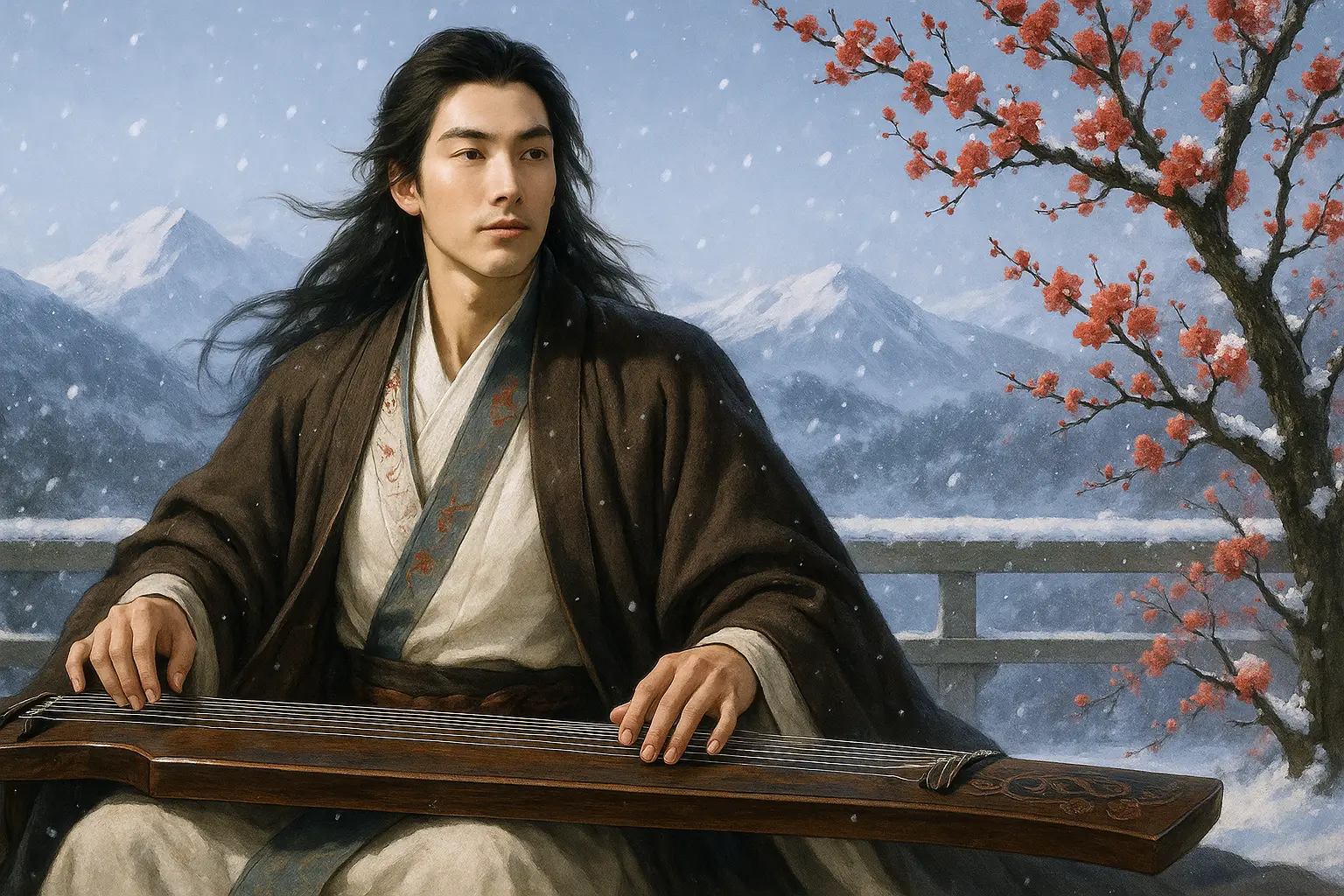
Yu Shinan (虞世南 558 - 638), a native of Yuyao in Zhejiang Province, was a prominent statesman, writer, calligrapher, and politician during the Zhenguan era of the early Tang dynasty. As one of the "Twenty-Four Meritorious Officials of Lingyan Pavilion," he rose to the position of Director of the Imperial Library. His calligraphy earned him a place among the "Four Great Calligraphers of the Early Tang," alongside Ouyang Xun, Chu Suiliang, and Xue Ji. In poetry, he inherited the tradition of Xu Ling and pioneered a refined, balanced, and harmonious courtly style. He also compiled the North Hall Book Excerpts, establishing a new genre of encyclopedic literature.








